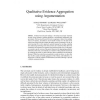Free Online Productivity Tools
i2Speak
i2Symbol
i2OCR
iTex2Img
iWeb2Print
iWeb2Shot
i2Type
iPdf2Split
iPdf2Merge
i2Bopomofo
i2Arabic
i2Style
i2Image
i2PDF
iLatex2Rtf
Sci2ools
119
click to vote
COMMA
2010
2010
Qualitative Evidence Aggregation using Argumentation
Evidence-based decision making is becoming increasingly important in many diverse domains, including healthcare, environmental management, and government. This has raised the need for tools to aggregate evidence from multiple sources. For instance, in healthcare, much valuable evidence is in the form of the results from clinical trials that compare the relative merits of treatments. For this, in a previous paper [5], we have proposed a general language for encoding, capturing and synthesizing knowledge from clinical trials and a framework that allows the construction and evaluation of arguments from such knowledge. Now, in this paper, we consider a specific version of the general framework for aggregating qualitative information about trials, and undertake an evaluation of this qualitative framework by comparing the results we obtain with those that are published in the biomedical literature. Whilst the results from our qualitative system are inferior, we show that they do offer a quic...
Applied Computing | Clinical Trials | COMMA 2010 | Evidence-based Decision Making | Valuable Automated Solution |
Related Content
| Added | 14 May 2011 |
| Updated | 14 May 2011 |
| Type | Journal |
| Year | 2010 |
| Where | COMMA |
| Authors | Anthony Hunter, Matthew Williams |
Comments (0)

